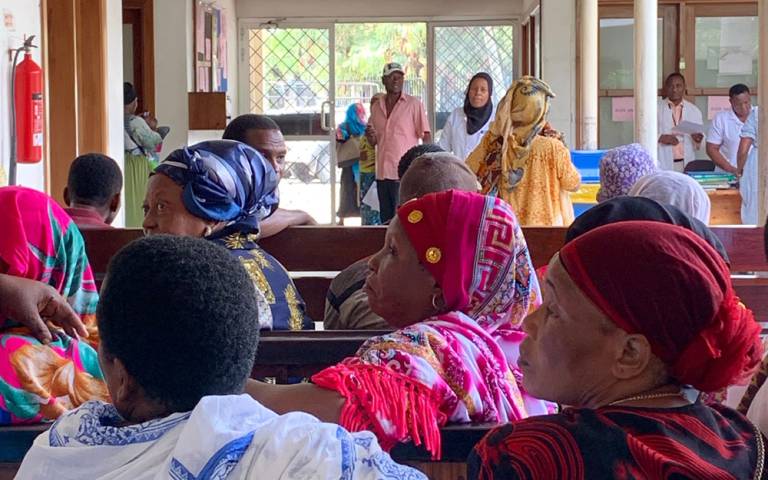Integrated health services in Africa can improve patient care and save money
9 October 2023
Integrated health care for chronic high-burden conditions in sub-Saharan Africa is feasible and health services could deliver high-quality services for less cost than with the current approach of separate vertical care for each condition, a new study led by UCL researchers shows.

Presently, health care services for non-communicable conditions such as diabetes and hypertension are fragmented and the quality of care is inequitable when compared with services for HIV. Much less than half of the people who start treatment for diabetes or hypertension on the continent remain in care one year later and about 2 million premature deaths are attributed annually to the effects of these two conditions. In contrast, the vast majority of people living with HIV are in regular care and virally suppressed. Mortality rates of people with HIV have fallen over 5-fold since their peak in the early 2000s.
There has been growing interest to establish one stop integrated service delivery clinics using the platforms developed for and the learning acquired by HIV programmes to improve outcomes for people with non-communicable conditions. However, high quality evidence on the feasibility of such clinics, their potential effect on HIV outcomes and their costs, was lacking.
The paper, which has been published by The Lancet, addresses this evidence gap. It reports a large study led by the National Institute for Medical Research in Tanzania, MRC/UVRI/LSHTM Uganda Research Unit and initially by LSTM, and later by the UCL Institute for Global Health.
The study involved multiple institutions from Tanzania, Uganda and Europe. It showed that integrated care in sub-Saharan Africa was associated with high levels of retention in care for people with diabetes or hypertension, that it did not adversely affect the rate of viral suppression among people with HIV, and that it was cost-saving for health care providers.
The World Health Organisation recommended integration of diabetes and hypertension care with HIV services in 2021, but at the time there was limited data on outcomes. This study supports the WHO’s recommendation, which also called for more data on health outcomes, cost, and preferences.
Dr Meg Doherty, Director of the World Health Organisation Department of Global HIV, Hepatitis and STI Programmes, said: “This was a large, ambitious and well-conducted study with the potential to change policy and practice. It is the first study to test successfully the concept of a fully integrated one-stop clinic for people with HIV or non-communicable conditions, with excellent HIV and NCD outcomes. It is exciting to see that by including hypertension and diabetes screening into the HIV clinic in these two countries, there was no change in HIV viral load suppression outcomes.”
Dr Gerald Mutungi, Assistant Commissioner for Non-Communicable Diseases (NCDs) in Uganda, said: “This study is the culmination of more than six years of research, conducted in partnership with the Ministries of Health. It demonstrates that integrated management is effective and cost-saving. The findings will inform future control of non-communicable diseases on the continent.”
Professor Tumaini Nagu, Chief Medical Officer of Tanzania, said: “Our study provides clear evidence for policymakers to consider scale up of integrated care for HIV, diabetes and hypertension. With the high burden of non-communicable conditions now in Africa, and more and more people living with multiple chronic conditions, integrated management will be an essential and cost-effective approach for the continent.”
Stephen Watiti, a patient representative based in Uganda and an author on the study, said: “Patients are interested in their overall health and do not look at diseases individually. Integrated management will be a big welcome going forward, thanks to the findings of this study”.
Katie Dain, CEO of the NCD Alliance, said “We need the same powerful and coordinated global response to tackle NCDs that we’ve seen for HIV. We know how to do this, and this time, we can build on existing infrastructure. Integrated care is a win-win opportunity to make NCD care more accessible for people living with HIV and cost-effectively strengthen our health systems.”
Corresponding author Professor Shabbar Jaffar (UCL Institute for Global Health) said: “I am very proud of all of the investigators. We worked as equal partners and because of this were able to pull off this most challenging of research studies.”
In December 2021, the team won the Times Higher Education award for International Collaboration of The Year.
The INTE-AFRICA project is funded by the European Union’s Horizon 2020 research and innovation programme. The research involved the National Institutes for Medical Research in Tanzania, The AIDS Support Organisation in Uganda, MRC/UVRI & LSHTM Uganda Research Unit, Liverpool School of Tropical Medicine, Tanzania NCDs Alliance, Shree Hindu Mandal Hospital in Dar es Salaam, Tanzania, Uganda’s Ministry of Health, Amana Regional Referral Hospital, Tanzania, Tanzania’s Ministry of Health, University of Liverpool, The National Forum of People Living with HIV Networks in Uganda, Makerere University College of Health Sciences in Uganda, London School of Hygiene & Tropical Medicine, University of East Anglia, University of Barcelona, and City University of New York Graduate School of Public Health and Health Policy.
Links
- Paper in The Lancet
- Professor Shabbar Jaffar’s academic profile
- UCL Institute for Global Health
- UCL Population Health Sciences
- INTE-AFRICA project
Image
- Patients at a chronic care clinic. Courtesy of Professor Shabbar Jaffar
Media contact
Mark Greaves
E: m.greaves [at] ucl.ac.uk
 Close
Close

